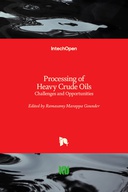Explore

Processing of Heavy Crude Oils
0 Ungluers have
Faved this Work
Login to Fave
Unconventional heavy crude oils are replacing the conventional light crude oils slowly but steadily as a major energy source. Heavy crude oils are cheaper and present an opportunity to the refiners to process them with higher profit margins. However, the unfavourable characteristics of heavy crude oils such as high viscosity, low API gravity, low H/C ratio, chemical complexity with high asphaltenes content, high acidity, high sulfur and increased level of metal and heteroatom impurities impede extraction, pumping, transportation and processing. Very poor mobility of the heavy oils, due to very high viscosities, significantly affects production and transportation. Techniques for viscosity reduction, drag reduction and in-situ upgrading of the crude oil to improve the flow characteristics in pipelines are presented in this book. The heavier and complex molecules of asphaltenes with low H/C ratios present many technological challenges during the refining of the crude oil, such as heavy coking on catalysts. Hydrogen addition and carbon removal are the two approaches used to improve the recovery of value-added products such as gasoline and diesel. In addition, the heavy crude oil needs pre-treatment to remove the high levels of impurities before the crude oil can be refined. This book introduces the major challenges and some of the methods to overcome them.
This book is included in DOAB.
Why read this book? Have your say.
You must be logged in to comment.
Rights Information
Are you the author or publisher of this work? If so, you can claim it as yours by registering as an Unglue.it rights holder.Downloads
This work has been downloaded 52 times via unglue.it ebook links.
- 52 - pdf (CC BY-NC) at mts.intechopen.com.
Keywords
- Energy technology & engineering
- Petroleum technology
- Technology, engineering, agriculture
Editions

